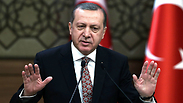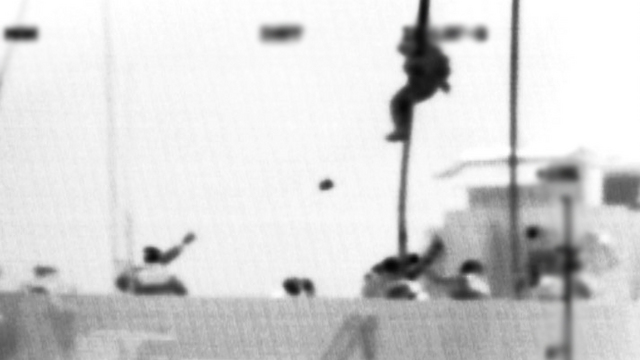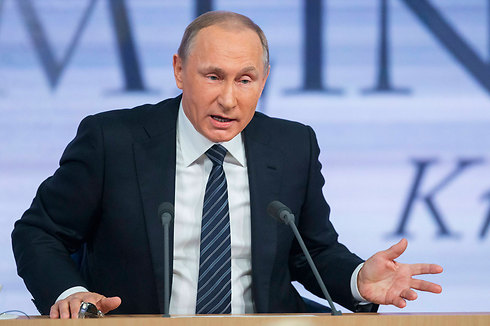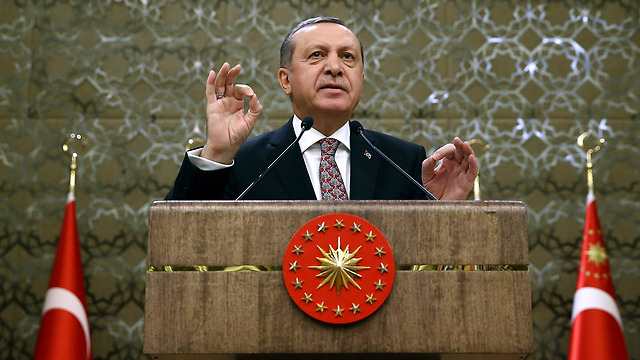
Racep Tayyip Erdogan, President of Turkey.
צילום: AP
Erdogan wants a trip to Gaza
OP-ED: Israel and Turkey are supposedly preparing to reconcile, but the complicated status of the region and its interweaving alliances delay them from reaching an agreement. At the moment, it’s simply more comfortable for Israel to wait.
Turkish President Recep Tayyip Erdogan already has a publicized event in the works, the kind he likes, in which he will announce the end of his country’s conflict with Israel. He took care to send a message to the Turkish and Israeli negotiation teams working on the official reconciliation agreement, stating that Israel has been and remains essential to Turkey, which is willing to go back to the close relationship from before the eruption of the Marmara affair (In 2010, a flotilla of ships attempted to break the Israeli naval blockade of Gaza. The IDF sent commandos to take over one of the ships, the Turkish MV Mavi Marmara, meeting violent resistance. Several Israeli soldiers were hurt in the incident, as well as some of the ship’s people. Ever since, relations between Israel and Turkey have been highly tense. -ed).


It’s not simple. Too many parties, in the political and security realms, are lurking behind the scenes. The Sultan from Ankara intends to personally travel to Gaza once the agreement is reached, stand in front of news cameras, and declare that thanks to his efforts the blockade has been lifted. Erdogan has said he doesn’t plan on entering Gaza through Israel’s Erez Crossing, and he surely understands that coming in through the sea isn’t a realistic option. What’s left? Egypt refuses to open the Rafah Crossing for him. President Al-Sisi has no intention of rolling out the red carpet for him.
There’s no clear schedule for a Turkey turning point, and Israel is unsurprisingly choosing to remain silent. Erdogan is the one who’s heavily hinting about a coming agreement. He’s already appointed a new ambassador in Tel Aviv, but those who pay attention will see that, all of a sudden, Israel is in no hurry. Jerusalem continues to suspect Erdogan’s fickle mood swings.
It’s a tough dilemma: What’s more important to Israel, strategic cooperation with Egypt or renewed use of Turkish airspace for military flights (with the IAF’s electronic gaze aimed at Syria and Lebanon)? How do you solve this complex equation without stumbling? It’s no secret that the Islamist Erdogan has been in a wild battle with Egyptian President Al-Sisi over the latter’s fight against the Muslim Brotherhood, and the hundreds of death penalties handed to the organization’s leaders. Beside the curses and threats, Erdogan also refuses to acknowledge the legality of Sisi’s administration. On the other side, Egyptian intelligence is paying close attention to the Turks “hosting” Hamas leaders.

The Marmara incident started a period of tense relations between Israel and Turkey. (Photo: IDF Spokesperson) (צילום: דובר צה"ל)
The Saudis are also engaged in a slow-going background effort to make peace between Egypt and Turkey. That complex triangle features neither a lot of trust nor a great amount of enthusiasm. It’s more comfortable for everyone there to just freeze things and keep the status quo going (as it is for Israel when it comes to its relations with Turkey). It’s not just Gaza that’s on the table, as Saudi Arabia and Turkey seek to remove Bashar Assad from power in Syria; in that, they contrast with the Middle East’s newest major player – Russian President Vladimir Putin, who is sending his fighter jets to protect Assad. He’s also made sure to send a clear message to Israel’s government, saying he’s not happy about the possible consequences of a Turkish-Israeli reconciliation.
Jerusalem is weighing their understandings with Moscow on the Syrian front in contrast with interests and goals they have on the Turkish front. While Egypt is neutral on the matter of Assad, our secret friend Saudi Arabia is threatening to send planes over to Syria. What does Israel think about a regime change in Damascus? Much like the Turkish reconciliation, it’s not really urgent. The longer Bashar Assad lasts, under Russian sponsorship, the calmer Israel will be. Those who’ve gotten to know the fragmented and warring factions of rebels and opposition forces are likely to prefer a weakened and obedient Assad.

Russian President Vladimir Putin. Not too pleased with a renewed Israel-Turkey freindship. (Photo: AP) (צילום: AP)
It’s interesting to try and figure out the division of labor between Russia and Iran. Putin took on the Syrian task five months ago, and the Iranian Revolutionary Guard isn’t giving up on their alliance with Damascus. Al-Sisi’s assertion that he’s willing to befriend the “new” Iran is threatening to hurt the incoming flow of Saudi aid money. Saudi Arabia has recruited the oil principalities into the coalition against the Revolutionary Guard in Syria. The Turks have a pretty comfortable relationship with Teheran. It’s interesting to imagine what Ankara might think about the first missile shipment going from Russia to Iran, and how our government might respond if these missiles find their way to Hezbollah in Lebanon.











